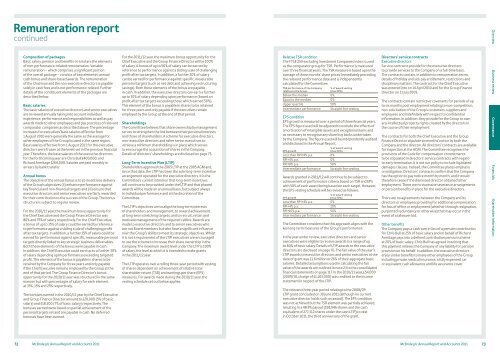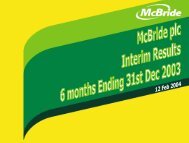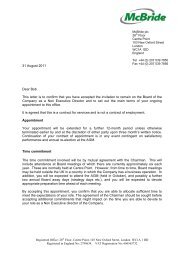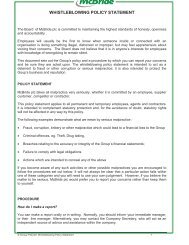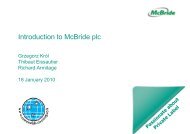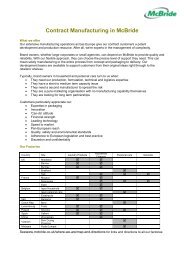pdf (2MB) - McBride
pdf (2MB) - McBride
pdf (2MB) - McBride
- No tags were found...
Create successful ePaper yourself
Turn your PDF publications into a flip-book with our unique Google optimized e-Paper software.
Remuneration reportcontinuedComposition of packagesBasic salary, pension and benefits-in-kind are the elementsof non-performance-related remuneration. Variableremuneration – which comprises a significant portionof the overall package – consists of two elements: annualcash bonus and share-based awards. The remunerationof the Chairman and the non-executive directors is payablesolely in cash fees and is not performance-related. Furtherdetails of the constituent elements of the packages aredescribed below.Basic salariesThe basic salaries of executive directors and senior executivesare reviewed annually taking into account individualexperience, performance and responsibilities as well as payawards made to other employees and pay practices of relevantcomparator companies as described above. The percentageincreases for executives’ base salaries effective from1 August 2010 were generally the same as the average forother employees of the Group located in the same region.Base salaries effective from 1 August 2011 for the executivedirectors were frozen at the levels set in the previous financialyear. Therefore, the base salaries of the executive directorsfor the forthcoming year are Chris Bull £400,000, andRichard Armitage £260,000. Salaries are paid monthly inarrears by bank transfer.Annual bonusThe objective of the annual bonus is to (i) incentivise deliveryof the Group’s objectives (ii) enhance performance againstkey financial and non-financial targets and (iii) ensure thatexecutive directors and senior executives are fairly rewardedfor their contribution to the success of the Group. The bonusstructure is subject to regular review.For the 2010/11 year, the maximum bonus opportunity forthe Chief Executive and the Group Finance Director was80% and 75% of salary respectively. For the Chief Executive,a bonus of up to 35% of salary could be earned by referenceto performance against a sliding scale of challenging profitafter tax targets. In addition, a further 15% of salary could beearned for performance against specific, measurable personaltargets directly linked to key strategic business deliverables.Both these elements of the bonus were payable in cash.In addition, the Chief Executive could earn up to a further 30%of salary depending upon performance exceeding targetedprofit. This element of the bonus is payable in shares to beretained by the Company for three years and only payableif the Chief Executive remains employed by the Group at theend of that period. The Group Finance Director’s bonusopportunity for the 2010/11 year was structured in the samemanner but with percentages of salary for each elementat 35%, 15% and 25% respectively.The bonuses earned in the 2010/11 year by the Chief Executiveand Group Finance Director amount to £20,000 (5% of basicsalary) and £18,200 (7% of basic salary) respectively. Thebonuses earned were based on partial achievement of thepersonal targets set and are payable in cash. No deferredbonuses have been earned.For the 2011/12 year, the maximum bonus opportunity for theChief Executive and the Group Finance Director will be 100%of salary. A bonus of up to 50% of salary can be earned byreference to performance against a sliding scale of challengingprofit after tax targets. In addition, a further 20% of salarycan be earned for performance against specific, measurablepersonal targets (such as net debt and achieving restructuringsavings). Both these elements of the bonus are payablein cash. In addition, the executive directors can earn a furtherup to 30% of salary depending upon performance (based onprofit after tax targets exceeding those which earned 50%).This element of the bonus is payable in shares to be retainedfor three years and only payable if the executives remainemployed by the Group at the end of that period.ShareholdingsThe Committee believes that share ownership by managementserves to strengthen the link between their personal interestsand those of shareholders. A scheme for executive directors,non-executive directors and other senior executives toachieve a minimum shareholding is in place which servesto encourage the acquisition of shares in the Company.Details of directors’ shareholdings are disclosed on page 75.Long-Term Incentive Plan (LTIP)Shareholders approved the 2005 LTIP at the 2005 AGM and,since that date, the LTIP has been the sole long-term incentivearrangement operated for the executive directors. It is theCommittee’s current intention that long-term incentiveswill continue to be provided under the LTIP and that phasedawards will be made on an annual basis, but subject alwaysto individual performance and at the discretion of theCommittee.The LTIP’s objectives are to align the long-term interestsof shareholders and management; to reward achievementof long-term stretching targets; and to recruit, retain andmotivate management of the required calibre. Awards aremade to executive directors and to senior executives whoare not Board members but who have a significant influenceover the Group’s ability to meet its strategic objectives. Whilstit is not a requirement of the LTIP, executives are encouragedto use the scheme to increase their share ownership in theCompany. The maximum award level under the LTIP is 100%of salary, the level at which it is intended to make grantsin the 2011/12 year.The LTIP operates over a rolling three-year period with vestingof shares dependent on achievement of relative totalshareholder return (TSR) and earnings per share (EPS)measures. For awards made during the 2010/11 year, thevesting schedule set out below applies:Relative TSR conditionThe FTSE 250 excluding Investment Companies Index is usedas the comparator group for TSR. Performance is measuredover three financial years. The TSR measure is based upon theaverage of three months’ share prices immediately precedingthe relevant performance date and is independentlycalculated for the Committee.TSR performance of the Companyrelative to the Group% of award vesting(max 50%)Below the median 0%Equal to the median 0%Upper quartile 50%Intermediate performance Straight-line vestingEPS conditionEPS growth is measured over a period of three financial years.The EPS figure used will be adjusted to exclude the effects ofamortisation of intangible assets and exceptional items andas necessary to recognise any share buy backs undertakenby the Company. The figure used will be independently auditedand disclosed in the Annual Report.% of award vestingEPS growth(max 50%)Less than RPI+4% p.a. 0%RPI+4% p.a. 0%RPI+8% p.a. 50%Intermediate performance Straight-line vestingAwards granted in 2011/12 will continue to be subject toachievement of performance criteria based on TSR and EPSwith 50% of each award being based on each target. However,the EPS vesting schedule will be revised as follows:% of award vestingEPS growth(max 50%)Less than RPI+4% p.a. 0%RPI+4% p.a. 10%RPI+10% p.a. 50%Intermediate performance Straight-line vestingThe Committee considers that this approach aligns with thekey long-term measures of the Group’s performance.In the year under review, executive directors and seniorexecutives were eligible to receive awards in a range of upto 80% of basic salary. Details of LTIP awards to the executivedirectors are disclosed on page 76. The fair value of the year’sLTIP awards to executive directors and senior executives at thedate of grant was £1.6 million or 26% of their aggregate basicsalaries. Detailed assumptions used in calculating the fairvalue of the awards are outlined in note 23 to the consolidatedfinancial statements on page 117. In the 2010/11 year, £54,000(2009/10: charge of £1,103,000) was credited to the incomestatement in respect of the LTIP.The relevant three-year period relating to the 2008/09LTIP grant concluded on 30 June 2011 (although no currentexecutive director holds such an award). The EPS conditionwas not achieved but the TSR element was partially achieved,resulting in a 48.9% payout (158,946 shares and the cashequivalent of 277,312 shares under the cash LTIP) to vestin October 2011, the third anniversary of the grant.Directors’ service contractsExecutive directorsService contracts provide for the executive directorsto provide services to the Company on a full-time basis.The contracts contain, in addition to remuneration terms,details of holiday and sick pay entitlement, restrictions anddisciplinary matters. The contract for the Chief Executivewas entered into on 14 April 2010 and for the Group FinanceDirector on 31 July 2009.The contracts contain restrictive covenants for periods of upto six months post employment relating to non-competition,non-solicitation of the Group’s customers, suppliers andemployees and indefinitely with respect to confidentialinformation. In addition, they provide for the Group to ownany intellectual property rights created by the directors inthe course of their employment.The contracts for both the Chief Executive and the GroupFinance Director stipulate six months’ notice by both theCompany and the director. All directors’ contracts are availablefor inspection at the AGM. The Committee recognises theprovisions of the Code for compensation commitmentsto be stipulated in directors’ service contracts with regardto early termination. It is not our policy to include liquidateddamages clauses. Instead, the Committee places emphasison mitigation. Directors’ contracts confirm that the Companyhas the option to pay notice month by month; and it wouldtherefore cease if the dismissed director obtained otheremployment. There are no excessive severance arrangementsor pension benefits in place for the executive directors.There are no agreements between the Company and itsdirectors or employees providing for additional compensationfor loss of office or employment (whether through resignation,purported redundancy or otherwise) that may occur in theevent of a takeover bid.Other benefitsThe Company pays a cash sum in lieu of a pension contributionfor Chris Bull at 25% of basic salary and on behalf of RichardArmitage pays into a defined contribution pension schemeat 20% of basic salary. Chris Bull has agreed in writing thatthis payment relieves the Company of any liability for pensionprovision on his behalf. In addition, the executive directorsenjoy similar benefits to many other employees of the Groupincluding private medical insurance, a fully expensed caror equivalent cash allowance and life assurance cover.Overview Business review Governance Financials Shareholder information72 <strong>McBride</strong> plc Annual Report and Accounts 2011 <strong>McBride</strong> plc Annual Report and Accounts 2011 73


